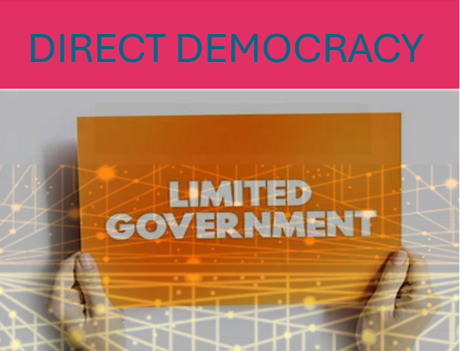You don’t have to agree with everything these thinkers and leaders had to say, but they definitely had some interesting ideas when it comes to "Limited Government."
Quote:
“The government solution to a problem is usually as bad as the problem.” 😂
Milton Friedman
Friedman believed that when the government steps in to fix things, it often just makes matters worse. His argument? The state should play a minimal role and let the people handle most things.
The government that governs least, governs best.” 👍
Thomas Jefferson
Jefferson was all about the freedom to do your own thing. He felt that the less the government meddled in people’s lives, the more freedom and prosperity everyone would enjoy. I would say that's limited government in a nutshell.
“The powers delegated by the proposed Constitution to the federal government are few and defined. Those which are to remain in the State governments are numerous and indefinite.” 🤔
James Madison
As one of the architects of the U.S. Constitution, Madison wanted to make sure that the US federal government didn’t get too big for its boots. He emphasized the need to keep most power in the hands of local authorities to protect personal freedoms.
Now, here's a personal favourite:
“The more the state ‘plans,’ the more difficult planning becomes for the individual.” 👏
Friedrich Hayek
Hayek was a fan of the free market and had little patience for overreaching government plans. The more the government tried to control the economy, the harder it became for individuals to make their own choices, he argued. He believed creativity and freedom flourished best when the government didn’t interfere too much.
So what does all this "limited government" mean? It means that keeping state power in check is the way to protect personal freedoms, encourage innovation, and prevent the state from becoming inefficient or overbearing.
Now, back to Milton Friedman for a moment—he had another important point with what he called "The Tyranny of the Status Quo."
According to him, once the government creates a program, it’s nearly impossible to dismantle, even if it doesn’t work!!!
The result? A bloated government, more taxes, fewer personal choices, and a loss of individual freedom. Sound familiar? ☹️
How about Switzerland
Switzerland, with its direct democracy, seems to have nailed the "limited government" idea. How do they do it? With three standout tools. 🔧🔨🪛
Frequent Referendums: Swiss citizens vote regularly on laws and government decisions, from the big stuff (like constitutional amendments) to specific policies. This keeps the government in check because nothing gets through without public approval. Power stays with the people. 🔧
Popular Initiatives: If you have a big issue you want to tackle, in Switzerland, citizens can gather signatures and push for a vote to change the constitution or address key concerns. This gives the people direct control and limits politicians from acting on their own. 🔨
Decentralization: Switzerland's federal system divides power between the federal government, cantons (like states), and municipalities. Local authorities have control over key areas like education, healthcare, and policing, ensuring that the central government doesn't get too powerful. 🪛
These mechanisms work like guardrails, preventing government overreach and keeping power where it belongs—with the people, the essence of the word Democracy. 🤩
It works in Switzerland, so maybe with some localised tweaks it’s a model others could follow. Who knows?
Find this article on X here: https://x.com/DirectDemToday/status/1847943469190222159

Comments